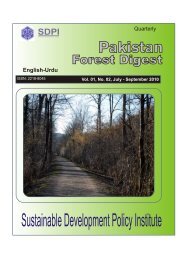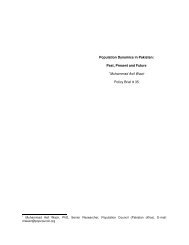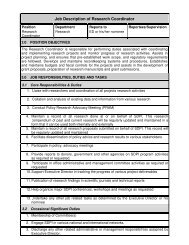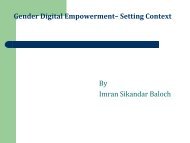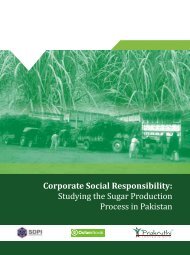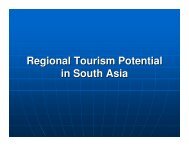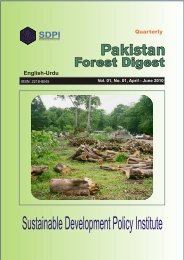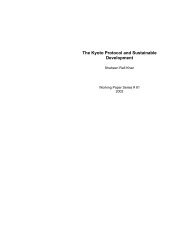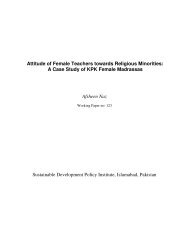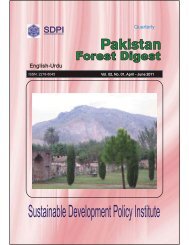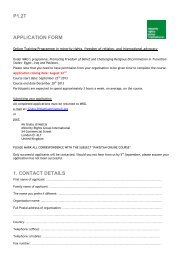Annual Report 2009-10 - Sustainable Development Policy Institute
Annual Report 2009-10 - Sustainable Development Policy Institute
Annual Report 2009-10 - Sustainable Development Policy Institute
- No tags were found...
Create successful ePaper yourself
Turn your PDF publications into a flip-book with our unique Google optimized e-Paper software.
<strong>Annual</strong> <strong>Report</strong><strong>2009</strong> - 20<strong>10</strong><strong>Sustainable</strong> <strong>Development</strong> <strong>Policy</strong> <strong>Institute</strong> (SDPI) and theInternational <strong>Development</strong> Research Centre (IDRC)Forge a Fruitful PartnershipThe Think Tank Initiative, launched by Canada's International <strong>Development</strong> Research Centre(IDRC), has selected SDPI amongst another 27 think tanks or independent policy research institutions,in Latin America and South Asia to receive a total of US$35 million to strengthen theirroles as influential players in national policymaking. Each think tank will receive long-term funding,enabling them to conduct research that is fundamental to the development of sound policy."We believe that the support given by the Think Tank Initiative and the collaboration with otherpolicy thanks in ours and other regions of the world will help SDPI to effectively catalyze thetransition towards sustainable development, defined as the enhancement of peace, social justiceand well-being, within and across generations” says Dr Abid Qaiyum Suleri, the ExecutiveDirector of SDPI. The core funding will be instrumental to develop its inter-disciplinary researchprogrammes, strengthen partnerships and networking with various stakeholders, improve policyadvocacy and outreach, and develop modern support system for a competent research capacity."Think tanks in the developing world are in a unique position to effect change in their societies.They can strengthen public policy debates and promote more objective, evidence-based decision-making.However, most never receive predictable core funding, instead depending onshort-term project grants and consultancy contracts. This Initiative provides think tanks with stablefunding so that they can attract, retain and build local talent, develop an independent researchprogram, and invest in outreach to ensure that research results are used in policy debates.“International donors continue to invest in policy research undertaken by Western institutionsand sometimes forget that it is strong local think tanks that often generate the most effectivepolicymaking in developing countries,” says David Malone, President of Canada's International<strong>Development</strong> Research Centre (IDRC). Launched by IDRC, the William and Flora Hewlett Foundationand the Bill & Melinda Gates Foundation in 2008, the Think Tank Initiative is a step towardsreversing this trend. It aims to support local think tanks to produce high-quality researchthat will improve policies and, ultimately, contribute to more equitable and prosperous societies.The US$35 million investment in Latin America and South Asia follows US$30 million in grantsto 24 think tanks in East and West Africa in <strong>2009</strong>.The Initiative received over 300 proposals from a wide range of Latin American and South Asianthink tanks that focus on broad national, social, and economic policy issues. Following a thoroughand rigorous review process, 28 institutions were selected from seven countries in LatinAmerica and five countries in South Asia - Bangladesh, India, Nepal, Pakistan, and Sri Lanka.The Initiative's three initial funders have now been joined by the UK Department for International<strong>Development</strong> (DFID) and the Netherlands Directorate-General for International Cooperation(DGIS). This strengthened partnership is a concrete move toward establishing and nurturingstrong local policy research institutions that ultimately help generate smart and effective policymaking.“This is an exciting and innovative initiative. It will provide a much needed support forevidence-based research and policy on global issues such as economic growth, good governanceand citizen empowerment, which will help tackle poverty in South Asia and Latin America”says Michael Anderson, Director General for <strong>Policy</strong> and Global Issues at DFID. The Initiative isenvisioned as a long-term investment over at least <strong>10</strong> years. The five donors have committed atotal of about US$1<strong>10</strong> million to the program.<strong>10</strong>S u s t a I n a b l e D e v e l o p m e n t P o l I c y I n s t I t u t e



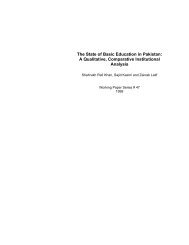
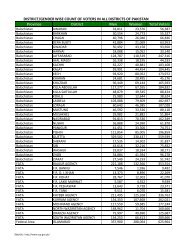
![(October - December, 2010) [13th SDC Special Bulletin]](https://img.yumpu.com/50118608/1/184x260/october-december-2010-13th-sdc-special-bulletin.jpg?quality=85)
